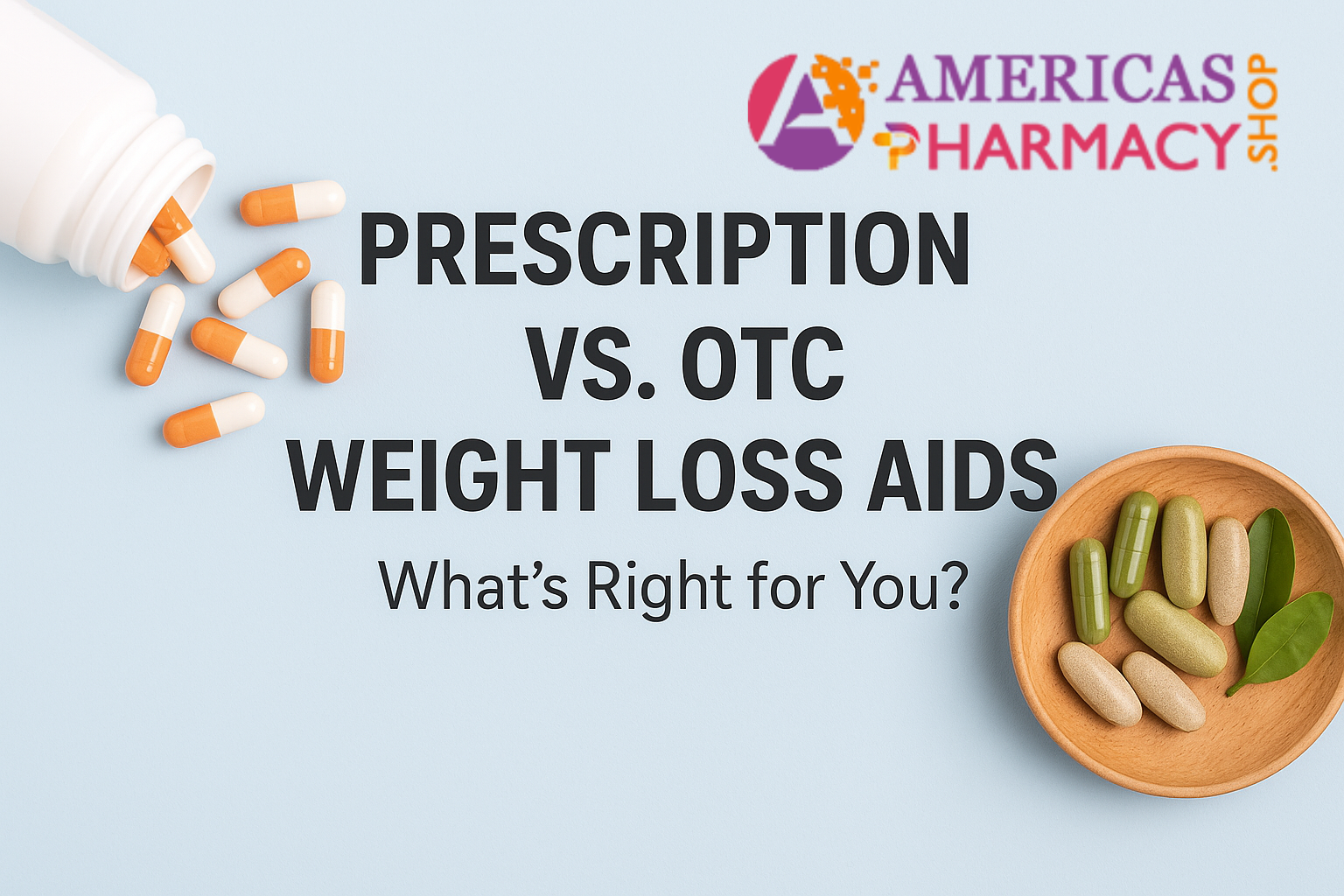Introduction
Losing weight is not just about appearance; it’s about health, energy, and quality of life. Many people turn to weight loss aids—some require a doctor’s prescription, while others are available over-the-counter (OTC). But which is right for you? In this blog, we’ll explore both options, their pros and cons, and help you make an informed decision.
What Are Prescription Weight Loss Aids?
Prescription weight loss medications are FDA-approved treatments provided by licensed doctors. They are typically recommended for individuals with obesity (BMI ≥30) or those with weight-related health conditions like diabetes, hypertension, or heart disease.
Buy Adipex Online – Grab 10% Off At AmericasPharmacy.Shop
Examples of Prescription Medications:
- Phentermine (Adipex-P) – appetite suppressant
- Orlistat (Xenical) – reduces fat absorption
- Liraglutide (Saxenda) – regulates appetite hormones
- Naltrexone-bupropion (Contrave) – reduces cravings
Pros:
- Clinically tested for effectiveness
- Monitored by healthcare providers
- May help with severe obesity
Cons:
- Requires medical evaluation
- Possible side effects (insomnia, digestive issues)
- Not suitable for everyone
Buy Phentermine Online :- Exclusive 10% Offer at AmericasPharmacy.Shop
What Are OTC Weight Loss Aids?
Over-the-counter (OTC) weight loss supplements are available without a prescription and can be purchased online or in pharmacies. They often contain natural ingredients, fat burners, or appetite suppressants.
Common Types of OTC Aids:
- Green tea extract supplements
- Caffeine-based fat burners
- Fiber-based appetite suppressants
- Orlistat (Alli) – lower strength, FDA-approved OTC
Pros:
- Easily available without a doctor’s visit
- Typically more affordable
- Can be used as a supplement to lifestyle changes
Cons:
- Quality and effectiveness vary widely
- Risk of unregulated or unsafe ingredients
- May not provide significant results
Key Differences: Prescription vs. OTC
| Feature | Prescription Aids | OTC Aids |
| Approval | FDA-regulated | Some FDA-approved, many supplements unregulated |
| Access | Requires doctor’s prescription | Easily available in stores/online |
| Effectiveness | Clinically proven | Varies (often mild effects) |
| Safety | Monitored by doctors | Can be unsafe if misused |
| Cost | Higher | Generally lower |
Which One Should You Choose?
- If you’re clinically obese or struggling with health conditions, prescription aids under doctor supervision may be safer and more effective.
- If you’re looking for mild support in weight management, OTC supplements could be an option—provided you choose FDA-approved or reputable brands.
Pro Tip: Always consult with a healthcare provider before starting any medication or supplement.
When it comes to weight loss, many people get confused between prescription drugs and over-the-counter (OTC) supplements. Both options promise results, but the approach, effectiveness, and safety levels are very different. Prescription medications are backed by clinical studies and FDA approval, which means their effectiveness and side effects are carefully monitored by healthcare professionals. On the other hand, OTC products are easily available and often marketed as natural or herbal solutions, but their reliability may vary. Understanding these differences is essential because choosing the wrong product not only delays results but may also affect your overall health. That’s why it is important to evaluate your current health status, weight loss goals, and consult a medical expert before deciding which path is best for you.
Conclusion
When it comes to weight loss, there’s no one-size-fits-all solution. Prescription weight loss aids may provide faster and more reliable results, but they require medical oversight. OTC products are easier to access but may not always be effective. The key is to combine whichever method you choose with a balanced diet, exercise, and healthy lifestyle changes.
FAQs
Q1: Are OTC weight loss supplements safe?
Answer : Some are FDA-approved, like Alli, but many are unregulated. Always check labels and consult your doctor.
Buy Phentermine Online :- Extra 10% Discount Available on AmericasPharmacy.Shop
Q2: Can I switch from OTC to prescription aids?
Answer : Yes, but only after a medical evaluation. Never combine both without supervision.
Q3: How long can I take prescription medications for weight loss?
Answer : It depends on your health condition and doctor’s advice. Some are for short-term use; others can be taken long-term under monitoring. Buy Adipex Online

